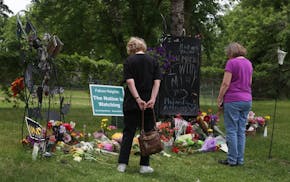Low-paid workers across the Twin Cities are getting a raise Thursday as both Minneapolis and St. Paul bump up their city-mandated minimum wages.
Both cities approved policies in recent years that eventually will require employers to pay at least $15 an hour — a mark that all Minneapolis businesses are expected to meet by 2024, followed by St. Paul businesses in 2027.
As the economic effects of the COVID-19 pandemic continue to play out, business owners have mixed responses to this year's step increases. Some point out that labor shortages in certain industries, such as hospitality, are forcing employers to raise wages even higher than the mandated levels. Others say the requirement is stretching already thin margins after a year of hardship.
St. Paul businesses with fewer than five employees are required to pay at least $10 an hour — a 75-cent hourly increase — starting Thursday. Those with six to 100 workers must bump up a dollar to $11 an hour, while large businesses with 101 to 10,000 employees must raise hourly rates from $11.50 to $12.50.
In Minneapolis, businesses with fewer than 100 workers must also raise minimum wages from $11.75 to $12.50 an hour, while larger employers are required to increase hourly rates by a dollar to $14.25. The cities will add another step increase next July.
"We are in a very different place, from a labor market standpoint, than we were a year ago," said Jonathan Weinhagen, president and CEO of the Minneapolis Regional Chamber of Commerce. He added that he thinks this year's increase will have "a pretty limited impact."
He pointed to the pervasive hiring signs in the Twin Cities as evidence of a burgeoning economic recovery. "I think there's more certainty than there has been," Weinhagen said.
In St. Paul, Golden Thyme Coffee & Cafe owner Mychael Wright is less sure about his financial future. Before the pandemic, Wright estimates that he and his wife, Stephanie, were on track to retire and find someone to take over the restaurant by 2022. Now that date could be pushed back due to revenue lost during the months COVID restrictions forced the restaurant to close.
Wright likes training and mentoring young workers, but said the climbing minimum wage hampers his ability to take a chance on teens.
"I do want people to make a good wage, but at $15-an-hour rates, coming in they have to know something," he said.
Golden Thyme is trying to "scratch back from COVID," Wright said, and he thinks government should be helping small businesses — not adding costs.
"It's horrible timing for everyone opening back up," said Kris Masanz, who owns the Neighborhood Cafe down the street. Thursday's increase will only affect her serving staff, but that money will come out of her bottom line, which she said "wasn't a lot pre-pandemic."
Some employers, like the Mississippi Market Co-op in St. Paul, have already met the $15 hourly mark. Chuck Showalter, the bulk buyer and receiver for the Selby Avenue store, said managers raised wages early in the pandemic, when the store was swamped and employees were risking their health.
"This last year has been so tough," he said, calling the pay raise for the store's most junior employees "long overdue."
Those pay bumps have had a ripple effect, indirectly increasing the pay for more experienced employees like Showalter, who is expecting a raise soon, even though he was already making more than $15 an hour.
"Many workers were out of a job or had hours reduced for a long time," said Eli Stein, lead organizer for the Restaurant Opportunities Center of Minnesota. "Of course this minimum wage increase is exciting, but it is not enough for what workers are facing right now."
Both cities sent out notices ahead of the Thursday increase, and municipal workers field and investigate complaints about businesses not complying. Minneapolis received 26 complaints about minimum wage violations between March 2020 and March 2021.
"The city believes a healthy labor market balances power between workers and employers such that they can more often agree on appropriate wages," Brian Walsh, director of Minneapolis' labor enforcement division, said in an e-mail.
Sonia Ross, 17, is two weeks into her first job as a back server at the University Club of St. Paul. She makes $12.50 an hour, so she won't get a raise this summer, but she's enjoying the work so far.
"My friends were kind of surprised by my pay. They thought it sounded low," Ross said. A friend recently quit working at the club for a better-paying gig, something Ross said she might seek out next summer — after she has some experience under her belt.
Katie Galioto • 612-673-4478

Falcon Heights, St. Anthony move toward renewing police partnership severed after killing of Philando Castile

Minneapolis reaches $150k settlement with eyewitness of George Floyd's murder
St. Paul partnership brings trust, opportunities to troubled Karen youth

Prosecutor shake-up in Mary Moriarty's office in murder case against State Trooper Ryan Londregan

